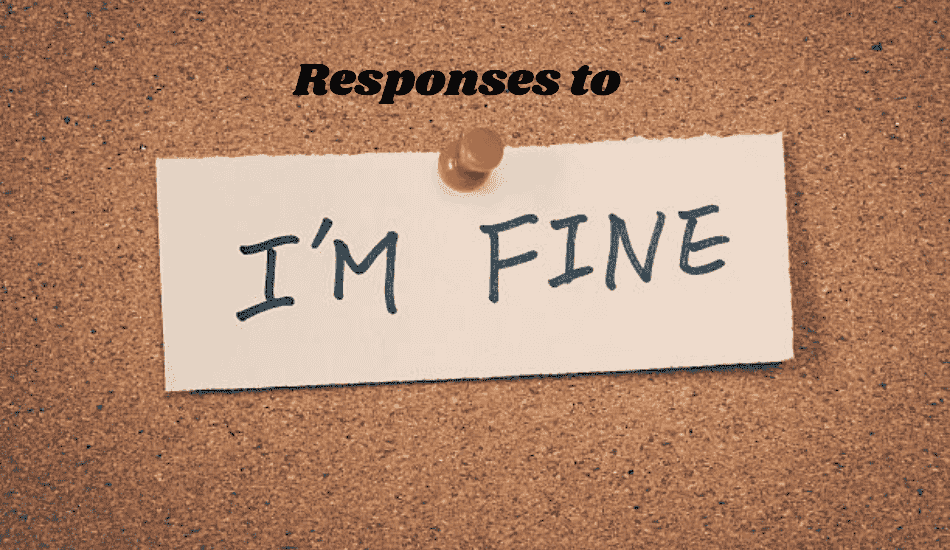Have you ever heard someone say, “I’m Fine“ but had a feeling something deeper was going on? It’s a phrase that’s frequently used to conceal feelings—sometimes out of habit, sometimes to avoid vulnerability. Whether you’re a friend, partner, colleague, or family member, knowing how to Responses to “I’m Fine“ with empathy, wit, or support can help build trust and connection. This guide delves into 200+ categorised responses to help you respond meaningfully in any situation, from casual conversations to serious heart-to-hearts. This list has something for everyone, whether you want to lighten the mood or start a more in-depth conversation.
Responses to “I’m Fine“
🔹 1. Supportive responses
1. Contact me if you need someone to talk to.
2. You are not alone; I have your back.
3. Thank you for sharing. I’m always available if you want to talk further.
4. I care about you, even on your “fine” days.
5. Please let me know if there is anything I can do.
6. Call me if things get tough.
7. I’m glad you’re okay; please contact me anytime.
8. I always support you.
9. I have your back no matter what you’re going through.
10. You always have someone who supports you.
Know Respond to “Aww”.
🔹 2. Encouraging responses
11. You have more strength than you realise. Keep pushing.
12. This is a good start, and better days are ahead.
13. You’re doing well; keep it up!
14. You’ve got this, truly.
15. I always root for you.
16. Proud of you for staying together.
17. Don’t give up; the storm will pass.
18. You are doing better than you think.
19. You’re making progress every day.
20. You inspire others simply by showing up.
🔹 3. Curious or Inquisitive Responses
21. Are you truly fine? You appear a little off.
22. Would you like to elaborate on that?
23. What does “fine” mean to you now?
24. What made today just fine?
25. Is there anything you’d rather not discuss?
26. Is there anything else on your mind?
27. Can you tell me what’s going on behind the scenes?
28. What has been weighing on you lately?
29. Are you really okay?
30. Ready for a deeper dive?
🔹 4. Empathetic/Reflective Responses
31. You’re not alone—I’ve had similar days.
32. Our perception of “fine” may not always be accurate.
33. It’s acceptable to experience negative emotions.
34. I understand you. Do you want to talk it out?
35. “Fine” can mean a variety of things.
36. Your feelings are completely valid.
37. “Fine” is an acceptable response. I’ve also used it.
38. It is normal to struggle at times.
39. You are free to express your feelings.
40. We don’t judge, just understand.
Responses to “I’m Fine“: 🔹 5. Humorous or light-hearted responses
41. Is it fine as in wine or parking ticket?
42. Is everything fine? Is it okay if the level of dominance is not global?
43. Is it fine-fine or “fine” with air quotes?
44. Should I send emergency chocolate?
45. Is caffeine the source of your “fine” feeling?
46. Fine? You need a better public relations team!
47. Is your cat holding you hostage?
48. Is this the code for “save me”?
49. Should I bring ice cream or memes?
50. Fine? This sounds like a cover story to me.
🔹 6. Reassurance Responses
51. You do not need to carry everything alone.
52. It’s okay to feel fine.
53. No need to be perfect.
54. You are doing enough just by being yourself.
55. Take one step at a time.
56. I am proud of your attendance.
57. It’s okay to feel anything here.
58. It’s fine to rest.
59. You are recognised and valued.
60. You are more than “fine.”
🔹 7. Dismissive/Neutral Responses
61. OK, got it.
62. Alright, then.
63. “If you say so.”
64. Noted.
65. Cool.
66. Sounds good.
67. Okay, thank you.
68. Don’t worry.
69. Great.
70. Okay, moving on.
🔹 8. Acknowledging and affirming responses.
71. Thank you for sharing.
72. Okay, thanks.
73. I hear you.
74. Noted. Please let me know if that changes.
75. That is fair.
76. I appreciate your honesty.
77. Okay, I respect that.
78. Good to know.
Thank you for letting me know.
80. Thank you for the update.
🔹 9. Redirecting Responses.
81. How’s your weekend going?
82. Have you watched any good shows lately?
83. Would you like to grab coffee sometime?
84. What fun activity did you do today?
85. Let’s do something fun this weekend!
86. What are you looking forward to?
87. Are you currently working on any new projects?
88. How is work going?
89. Cool, have you read any good books lately?
90. What was your favourite part of the week?
Responses to “I’m Fine“: 🔹 10. Playful or teasing responses.
91. Is everything fine? You could do better!
92. Did you say it with a straight face?
93. Fine? Should I be alarmed?
94. “Fine” is suspicious!
95. Are you certain you aren’t a robot?
96. Does “fine” mean everything is on fire?
97. Okay, and what else?
98. If you are in trouble, blink twice!
99. Should I send backups?
100. Should I bring snacks and stories?
🔹 11. Concerned but respectful of privacy.
101. I got it. If you ever feel the need to open up, I am here.
102. Okay. There is no pressure.
103. Please know I’m present.
104. Alright. You speak when you are ready.
105. My door is open anytime.
106. I am always available.
107. No rush, just here.
108. Let me know when you’re ready.
109. I am not here to push, but to listen.
110. I understand. Let’s take it slowly.
🔹 12. Providing Help and Practical Support
111. Need assistance with anything today?
112. Can I help you with your workload?
113. Is there anything I can take off your plate?
114. Need help with something?
115. Do you need assistance with tasks?
116. I can handle that for you.
117. Looking to delegate something?
118. May I pick up something for you?
119. Looking for a ride or errand buddy?
120. I’m happy to assist in any way.
🔹 13. Promoting self-care.
121. Remember to drink water today.
122. Make time for yourself.
123. You deserve to rest.
124. Consider a warm bath or nap.
125. How about taking a walk outside?
126. Reward yourself today.
127. Rest is also productive.
128. What did you do for yourself today?
129. You may pause.
130. Self-care is not selfish.
🔹 14. Reflective Listening.
131. Sounds like a busy day.
132. How tired are you really?
133. There appears to be more beneath the surface.
134. I detect a sense of heaviness.
135. Are you trying to keep it together?
136. I’m sensing something deeper.
137. The response seems guarded.
138. I can tell you are doing your best.
139. It appears you’re holding back.
140. Your tone and words do not match.
🔹 15. Reassuring but light-hearted
141. Glad you’re okay—would you like to watch something silly?
142. Are you okay? Great—pizza improves it.
143. Let’s go have some fun.
144. Are you fine? That’s enough for now.
145. Let’s have ice cream and pretend everything is fine.
146. While fine, laughter is even better.
147. I have memes for emergencies like this.
148. Let’s cure “fine” with bad jokes!
149. Fine, you need tacos. I will bring them.
150. We’ll upgrade that “fine” soon.
🔹 16. Practical responses
151. Please notify me if you need to reschedule anything.
152. Would you like to change our plans?
153. Should I check back later?
154. Looking to skip today’s tasks?
155. Looking for a break from responsibilities today?
156. Let’s make things easier now.
157. Looking to simplify things?
158. I will handle what I can.
159. Let’s split the workload.
160. Relax, I’ll take care of this.
🔹 17. Insightful/Emotionally Intelligent Responses
161. The phrase “I’m fine” can convey various meanings. What exactly is going on?
162. We often say we’re fine when we’re actually not. Is that true for you now?
163. “Fine” can mean “barely hanging in there.”
164. I understand that “fine” can be a shield. Is something happening?
165. Saying “fine” does not imply you are. Want to go deeper?
166. You do not owe anyone perfection.
167. I respect your management style.
168. It takes bravery to say you’re “fine” sometimes.
169. How would you describe your feelings other than “fine”?
170. What is your definition of “fine” today?
🔹 18. Situational/Context-Based Understanding
171. I understand if you want to keep the meeting brief.
172. I understand why you may claim to be fine in front of others.
173. Kids often say they’re fine when they can’t speak.
174. In the workplace, the term “fine” can indicate stress.
175. Texts can conceal genuine emotions—thank you for responding.
176. Recognising emotions digitally can be challenging.
177. Social norms often lead us to say “fine” by default.
178. Cultural expectations can put pressure on us to appear normal.
179. Leaders often say they’re “fine” to avoid showing weakness.
180. At school, “fine” can be interpreted as “leave me be.
Know Best Answers to “What Do You Want From Me?”.
🔹 20 Mixed-Use Replies (Flexible for Any Tone)
181. That’s acceptable. Please let me know if that changes.
182. You can find me.
183. Do you want to talk later?
184. I’m committed for the long term.
185. I have ears and snacks.
186. Text me anytime you need to vent.
187. Let’s work through this together.
188. You don’t need to say anymore—but I’m here.
189. Coffee, walk, or chat? Take your pick.
190. You are valued always.
191. You are more than your current feelings.
192. Your honesty is extremely valuable.
193. Reaching out demonstrates strength.
194. Allow yourself to pause and breathe.
195. It’s a difficult situation, but I appreciate your trust.
196. Do you want to unpack it when you are ready?
197. There is no need for a fix; simply listen.
198. Saying “fine” is acceptable. Feeling better.
199. We’ll ride the wave together.
200. Thank you for being honest with me.
FAQs
Q1: Why do people say “I’m fine” when they aren’t?
People frequently use “I’m fine” as a shield to avoid showing vulnerability, fear of being judged, or simply because they aren’t prepared to talk.
Q2. What is a good way to gently probe someone who says “I’m fine”?
Ask open-ended, caring questions, such as “Are you sure?” or “Want to talk about it?” without being pushy. Respect their boundaries.
Q3: Can I use humour in these situations?
Yes, but only if the situation and mood permit it. Gentle humour can help someone open up.
Q4. What is the best response if I am unsure how they feel?
Use empathetic or reflective responses, such as “It’s okay if you’re not okay,” or “I’m here if you want to talk later.”
Q5. Is it appropriate to move on if someone says they are fine?
Yes, if they clearly state that they want to drop the topic. You can always return later or keep the door open for conversation.
Conclusion
The phrase “I’m fine” can either end a conversation or lead to a deeper connection. How you respond is important. With these 200+ carefully categorised responses, you now have a toolkit for navigating any emotional tone, whether supportive, curious, playful, or practical. Whether you want to listen, lighten the mood, offer assistance, or gently uncover more, these responses will help you have better conversations, stronger relationships, and a better understanding of those around you. Remember that “I’m fine” could be someone simply waiting for the right person to ask again—sincerely.


